HIT CHANNEL EXCLUSIVE INTERVIEW: December 2012. We had the huge honour to talk with a legendary musician and an insightful person: Frank Marino. With his band, Mahogany Rush, and as a solo artist, he has made some incredible music and still pleases the fans with his extraordinary skills on guitar. Frank & Mahogany Rush toured with Aerosmith, Queen, Jeff Beck, Cheap Trick, Ozzy Osbourne and bands like AC/DC and Judas Priest used to open their shows. Read below the very interesting things he told us:
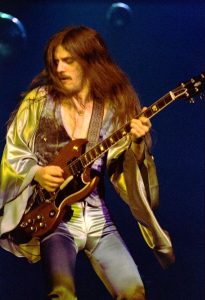 First of all, how is your shoulder this period?
First of all, how is your shoulder this period?
Just getting better, now. Except the other one it ‘s starting (laughs). Really, the other one it’s starting to hurt. I don’t know what’s going on.
How close is the release of your first DVD from Agora in Cleveland? I know you had some serious problems with the drums sound.
On Christmas’ Eve, on the 24th December, 11 o’clock at night, I thought I had finished all the drums. But I looked back at some of the other stuff that I had done earlier and I felt that I still, although not as much, but I still have a little bit things to do here and there. I can’t say whether it’s going to be another 4 or 5 songs to look back and fix some things. How long that it’s going to take, I don’t know. But when it gets done, then I will have to start on the next stage of the project, which is what I would have done two years ago when I came home with the tapes. I would start mixing and tuning and all that stuff, that I would do if things were fine. But I had to add these two years to get there. So, I’m two years ago. When I finish the drums, I will go to the next stage. From that point on, it would probably be another 2-3 months.
So, we hope until summer to be released.
If I’m really lucky. God knows if we will have it until summer. Things happen. I really never expected to have to do what I’m doing. The job I just get is really unbelievable. You have no idea how many cuts we had to make something like this. It’s almost a million cuts that I had to make digitally, one-by-one.
How much live will be the sound of the DVD? Did you have to overdub everything?
No. The point was that I didn’t want to overdub. If it would be a record, I would say to the drummer “Ok, come in and overdub the drums and we will fix it”. But because I wanted it to be exactly live, that’s why I cut them up, one beat at a time. And basically I have to take this damaged piece of audio and fix it. Fix each one, each beat which the drummer played. And there are a lot of beats in a 12-hour concert. So the end result it’s perfect. It’s absolutely what we would have had if the recorder had worked. I even made sure that if we made a mistake, I kept the mistake. I didn’t want to change anything or make it better. I want it to be really what it was. So, I went to a lot of troubles to make sure that every little noise and every little mistake is exactly what it was. As far as the guitar and vocals and rhythm guitar and bass, I haven’t even looked at them yet. I plan to keep it pretty much realistic. I was thinking that on some of the songs that we did from the old records, I would add some of the keyboards-bass or something that can make the songs that they were. For instance, we did a song long time ago, called “Strange Universe”. In that song, on “Strange Universe” there is not really a bass guitar, there is a bass Minimoog. So, when we play it live, the bass Minimoog part is done on bass guitar. So, I was thinking of turning these bass guitar parts on Minimoog sounds. So, I think to lay it down just as the old songs. Everything that it sounds good but it doesn’t really change what people think. When you look at the DVD, you see everything, not just hear it. We don’t want to look different than it sounds. The reason that a lot of people overdub is that their motive by making the DVD is to be able to make more DVDs or to be able to make more records or to be able to have a career. To make sure that everything is perfect, that people will like them, but my motivation by making this DVD is not to fake. I don’t know how to do this, either. I just want to be a history of what we did that day, whether it’s good or bad, I don’t really care and I don’t know if anyone has done a 12-hour concert. We do something for the future here (laughs).
Have you done any writing or recording for a next studio album?
When I’m not working on this thing, yeah I have a lot of ideas. But to sit down and record them, it’s a whole other thing. I don’t have the time. I mean I put 15 hours every day for two years (ed: on the DVD) to this job. And I haven’t done anything else but this job for two years. And that’s why I got my shoulder hurt.
 These ideas are about the blues album you wanted to do or something else?
These ideas are about the blues album you wanted to do or something else?
It’s the same thing. I’ve been trying to do that for 15 years and I haven’t finished it. It hasn’t finished. But when I get the time to do it, I will actually finish it. If I hadn’t had this problem with the DVD, my plan in December 2010 was “Ok, I will mix the DVD from December to February, then finish the blues album, then do a new Mahogany Rush album”. And by the summer (ed: of 2011), I would have 3 things. But God said “No, no. You ‘ll have to fix the DVD first”. So, this is what I’m doing.
Will you tour in 2013?
Well, I had offers for touring but I can’t say “Yes”. So, when everybody calls me and says “Do you want to go out and do something?”, I can’t say “Yes” because I don’t know when I will finish it. So, for me to be ready to go on a tour, it’s not just to call my band and say “Oh, we are leaving next week”. I have to bring them in and to rehearse with all these people, it takes a lot of time to get ready to do it. And I can’t do that, I have to say to people “No, no. Maybe we will tour next year. I don’t know”. You know who Paul Gilbert is?
Yes. He admires you.
He called me up a few months ago and he told me that he wants to put up a camp with guitarists in the mountains, outside New York and he offered me to come. I wanted to go and I was thinking that it would be fun, but I had to tell him that I can’t. I can’t in July (2013). I don’t know if I have finished it yet. I wanted to say “Yes”, but it will last for 5 days in July and I told him “Look, I want to come but I don’t know where I will be in July”. People want to do some gigs, but I can’t answer that question until I know what is happening with this project. Because if I stop doing that and I start doing something else, I will never finish it. I will never come back and finish it. I have to finish it. I’m very close.
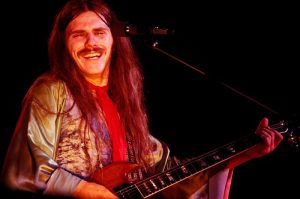 Can you explain us why the California Jam II in 1978 (with Aerosmith, Ted Nugent, Santana and Heart) wasn’t a good memory for you?
Can you explain us why the California Jam II in 1978 (with Aerosmith, Ted Nugent, Santana and Heart) wasn’t a good memory for you?
(Laughs)Because of the way I look at the music business. I’m sure that this gig was very good for everybody, I’m sure that the people loved it, I’m sure that the bands loved it. But I don’t look at the music business the same way and for the same reasons as most people. Because of the way I look at art and music, for me California Jam was like a symbol of everything I don’t like. It was a commercialized “sell-sell-sell”. You know, every time I look at the Stones concerts and Live Aid and Live 8, when they make these giant concerts, it just seems to me that this has nothing to do with the actual music. It’s about the bands, the gathering, the coolness and the guests, not about the music. For me that’s the bad thing. This doesn’t make me feel very good. I look back on it and I say “Well, it could have been good, but the way it happened was too commercial”. I’ve never been a very commercial guy.
Maybe, it’s better for you. You sleep better at night.
Yeah, I’m happy doing what I’m doing. I’ve always been a non-commercial guy and some people think that the songs are too long and they don’t get on the radio. Yeah, but that’s what I do. Listen, I play 5 instruments, I produce music, if I wanted to get on the radio I could do it (laughs). I’m not interested in it. For me to make commercial music it’s like asking me to go on the American Idol. I look it at the same way. Something that I wouldn’t want to do. I remind you, that I do write pop tunes. I write old-school pop tunes. I have over 80 or 90 pop tunes that I have written and recorded some of them.
To be performed by you or be someone else?
No. I just listen to them for fun, but I don’t think I could perform most of them. They don’t fit to me.
Give them to other people.
Yes, if someone come along and is that kind of artist and wants to do these songs, I ‘ll say “Sure, go ahead and do these songs”. I just do it as a kind of hobby. I like to write pop tunes. They are very easy to remember. They are very short: 2-3 minutes.
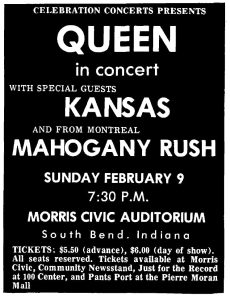 In 1975 you supported Queen during their “Sheer Heart Attack Tour”. How was the experience?
In 1975 you supported Queen during their “Sheer Heart Attack Tour”. How was the experience?
It was hard. It was a hard experience. We were young and in those days there was a thing that happened. I don’t know if it still happens but back then in the early ‘70s the bands were just beginning to become super-recorded. There was a movement, right? The bands were very competitive and I come from the background of the ‘60s where it wasn’t competitive at all. Woodstock, that kind of music for me is that everybody helps each other, everybody is friend, think of the Grateful Dead and Jefferson Airplane. That’s where I come from. So, in the ‘70s I started working with other bands and I thought it’s gonna be like that. In this tour with Queen, the crew of the other bands would do things to us: turn off the lights, cut the power, stuff like that. Every night they were doing these things. It wasn’t the band that it was doing it, it was the crew or the managers. I just had a horrible time and we did a lot of touring with them and every day we had a gig I was saying “Oh no. What ‘s gonna happen today?” So, I didn’t really have a good time doing it. There was too much competition. I don’t think competitively at all. I don’t care about that. I’m just a normal guy. That wasn’t a happy experience. Most of the gigs that I did in the ‘70s had some element of that feeling. That’s why in 1993 I quit music. I wasn’t coming back. And the only reason that I came back was because of my fans on my website. I didn’t even have a website, they came into me. They basically said “Come back and do 10 gigs here and 20 gigs there. And that’s what I ‘m doing ever since 1998, 1999. I do 20 gigs per year or 10 or 4 or none. I do it when it’s gonna be fun. Because there is no money in it. .
AC/DC opened your shows in 1979. Did you expect that they would become so popular?
Yes, I did actually! And there are two reasons for that: Firstly, they sounded really, really good (laughs). I liked what they did. It wasn’t what I would do, but it was something that they were good at it. Very-very honest. No faking, you know. The other reason was that if you would think about it, almost every single band who opened for me, became successful.
As Judas Priest.
Everybody! Look through the list and you will see that the bands who opened for me at some point, they all became very big. I didn’t just notice that until 20 years later. I looked at the list and I said: “Oh my goodness! This band opened for me and became big”. It happened all the time. It’s not a surprise.
You played at Bill Graham’s Day on the Green-.
-I should say something about that. The Bill Graham’s shows that I did for him was Day on the Green, the Monsters of Rock and the Winterland gig. These shows were exactly what I told you about the Woodstock days. I was never disappointed at a Bill Graham concert. Because the way he did the shows, is the way it should be. At a Bill Graham concert I never saw a competitive crew acting stupid. Everybody did it the right way, and that’s probably because of Bill. I loved playing for Bill Graham. I would play for Bill Graham for free. And the way he did things was the absolutely way to do it. This thing is gone. There isn’t any other promoter like him, and I think there will never be.
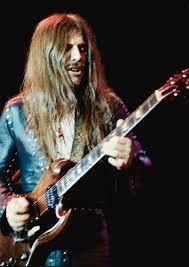 That’s why he is the greatest promoter of all time.
That’s why he is the greatest promoter of all time.
And he was a very-very nice guy and especially nice to me. Very kind, very respectful. People said some things about him sometimes. I don’t know what they are talking about. Bill Graham that I knew, was a fantastic person. I wish he was still around. If Bill Graham hadn’t died, I would ask him to manage me. He was the right person. I liked him very much and he liked me too.
I saw a poster from Bill Graham’s Day on the Green #4 in 1976 when Mahogany Rush played with Jeff Beck and Blue Oyster Cult at Oakland Stadium. Were you surprised by Jeff’s playing? Did you meet him?
Jeff Beck? No, I never met him. We were booked together more than once actually. We played together more times. I think he’s a fantastic musician, a great musician. I really like what he was doing with Jan Hammer (Mahavishnu Orchestra- keyboards) at the time. I was just thinking it was really cool. Especially, I love Jan Hammer. He’s amazing. But I never got the chance to meet Jeff Beck or play with him. You know, sure everyone would like to. He’s one of the few guys who still feels real. He’s very dedicated to his instrument, he’s real, he likes to experiment, he likes to do things differently and I like that.
By the way, I saw that during these shows Nils Lofgren (Bruce Springsteen & E Street Band, Neil Young- guitar) was low in the bill and I have spoken to him.
Nils Lofgren actually plays with my drummer, Timm Biery, who played on “Juggernaut” album, “Power of Rock ‘n’ Roll” and “Full Circle” and he used to tour with me quite a bit. When he wasn’t working with me, he was with Nils Lofgren. He also worked with Danny Gatton and with Paul Reed Smith. I haven’t met Nils but I know him out and Timm tells me he’s ok.
What went bad between you and Columbia Records?
Never went good, from the first day (laughs). I was in a record company before Columbia Records, called 20th Century, owned by 20th Century Fox. When I went to Columbia, everything changed for me because we moved from Los Angeles to the New York City. You have to understand that when I went to Columbia I was exactly the same kind of person I am. It was all about business and I just don’t like business. I didn’t agree with everything. A lot of artists who agreed, they made money. They said “I’ll try that, because I will make money”. I can’t do that, because I just don’t care about things like money. I don’t care, I never cared about at all. Because of that, my attitude was: I will do what I want, I will record what I want, the way I want, I will produce it the way I want, I wanna jam, I wanna make long tunes and I don’t care if they don’t get on the radio. That created a problem at Columbia right away. I wasn’t part of the game. I wasn’t part of the musicians who hang around, they do all the right things and go to the parties. I just don’t like that. I’m a religious guy. And that created a problem and we were always arguing. Arguing over album covers, over songs length.. And that’s why it didn’t work out. Maybe if I would have changed, they would have done more for my records. I wish they would have changed. I didn’t want to change.
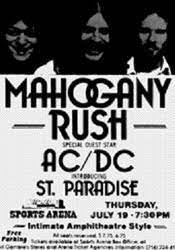 Do you think the collapse of the major recording labels is some kind of justice for their corporate greed all these years?
Do you think the collapse of the major recording labels is some kind of justice for their corporate greed all these years?
Absolutely! Absolutely! Look, I ‘ll give you an example: I left Columbia Records in 1983, after “Juggernaut”. When I left the label, I still had one record to do with them. But this record was my option. Usually, the record company has the option to pick up another record. At that particular time I had the option. If I would exercise the option and I wanted to do another album, they had to do it. I chose to not exercise the option. I chose to leave. They didn’t tell me to leave. I said “I’m leaving” and there is nothing they could do about. And I did leave. I did that because of the extent of the corporate greed I saw. But that time, I had 12 years of continuous problems. Things that they wanted me to do but I didn’t like. The reason I tell you this is because on that date, the date I left, I took my “Juggernaut” record, the 12inch record and I bought a clock. I put the clock to the record and I made a clock out of the record, and on the base of the clock was the record. And I put that clock on my wall, in my home at the time, and I said that won’t change the battery of the clock when it would run out, until the corporate music system has totally collapsed. I watch that clock and I’m happy to say that it has almost done.
I ‘ll tell you something: If you look at the Law, you ‘ll find out that a corporation is considered a person in Law. The most people don’t know that. A corporation according to Law is considered a person. And I always say “If a corporation is a person, the exact person is a psychopath. Or a sociopath. That’s the kind of person a corporation is. Because a corporation doesn’t give a damn if you and me are human beings, whether you are hungry or not hungry. A corporation is a scheme that has some kind of weird personality disorder. And it has influenced everything, not only music. Sports, politics, it’s everywhere. And I think this is wrong. You are Greek and you come from a country that invented democracy. Somehow I think they hadn’t corporations in mind when they invented democracy. I’m a very anti-corporate guy. I don’t like to buy something which belongs to a corporation, I would prefer to buy by someone else.
I’d rather download for free something from a major label act than to give my money to them.
Yeah. Listen, I don’t agree with marching and making a lot of noise and with rebellion and revolution. I don’t agree with that. I ‘m a Christian and that’s not what I do. But I do agree with not being part of something you don’t believe it. When you live somewhere you have to buy a car or a bike, so you can’t really get away from it totally. You can do as much as you can. I ‘m not involved in anything corporate-run and I’m not interested in that. Quite honestly, regarding music business, there is nothing they can offer me, that they would me getting involved in because I don’t really don’t care about the money I would make. What else they would offer? That’s all what they ever offer anybody. Money and fame. And usually it’s just fame and they steal the money (laughs).
Had you recorded any of the jam sessions you did with your friend Steve Marriott (Small Faces, Humble Pie frontman)?
You know, we did record these things.
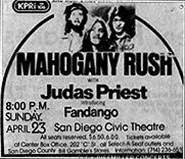 Do you have any bootleg?
Do you have any bootleg?
The problem is my tapes were all destroyed. I don’t think you’ll ever find an artist whose tapes from his first 12 years of music were all destroyed. They were all destroyed. There are no masters. There are some quadraphonic mixes but there are not multi-tracks masters for my entire career in the ‘70s. They don’t exist. So, if someone wants to come back and remix or whatever, it ‘s impossible. Those tapes are gone. I was very-very upset when I found that out and I found that out only in 1989 when I went to get the tapes. So, I had tapes from jamming with Steve. I was never out of the studio. I was always in the studio! There were so many tapes. There are all gone. And the only things left are the vinyl records or the tapes of the quadraphonic mixes of some of those records. It’s weird what happened because I look through computers and Google to the history of music and I can’t find any other artist whose tapes didn’t exist somewhere. So, I’m pretty much the only guy that it ever happened to.
You had the opportunity to join (Paul McCartney’s) Wings. Could you imagine yourself as a member of Wings?
I happened to like The Beatles and I really like Paul McCartney. It’s not like Paul McCartney came up to me and said “Do you want to join my band?” There were some people from my record company who basically said “Look, they have an audition to Paul McCartney’s new band. We spoke at some folk to go and try. We believe you’ ll get the gig because of the type of guitar player you are at the time. Let’s go do it”. And I said “No”. The reason I said “No” wasn’t that I don’t like Paul McCartney. I do, I like Paul McCartney. I said “No” because I had to tell my band “Goodbye”. We had only been together I think a year or a little more and I thought at the time that’s it’s not a long time to tell them “Goodbye”. I said “I just can’t do it”.
Are you frustrated when some journalists call you a “Hendrix clone”?
(Laughs) “Frustrated” it’s a really mild word. If there is a phrase I wish I never heard, it’s that. I made a mistake in the sense that when I did my first album (“Maxoom”), I was 16 years old. I wrote a song about Jimi Hendrix and I dedicated the album to Jimi Hendrix who had just died. Most people would do something like that. Since I played the same kind of music as Jimi, and since I used to play his songs, some journalists didn’t like that and started to say “He ‘s ripping off Jimi Hendrix, he’s Jimi Hendrix clone” or whatever. I happened to like Jimi Hendrix. Certainly I wouldn’t stop playing his songs or change my style, that’s the way I play. I just kept doing what I’m doing, it was getting worse and worse. I was pretty much the first guy who did that kind of music and I was doing it in 1971. I was doing it since he was alive and I did it in 1971 publicly and no one else was. They jumped on that. It took many-many years since other guitar players started to play that style. Look at the ‘70s music, you’ll see that first of all Robin Trower changed his style and became like that and much later on, you had Stevie Ray Vaughan. Then it started the whole blues-Hendrix-Stratocaster-Marshall thing but for many-many years I had to carry that weight. The funny thing is that all the other artists who did that kind of music, that kind of guitar, they never were called the same name. Only I did and I’m still called that thing. It’s 2012 and I don’t understand that.
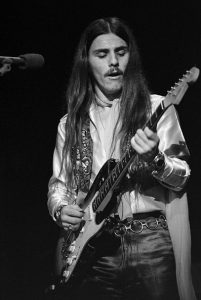 We have to say to the younger fans, that this story started from the major music press, not the underground press. From the corporate magazines.
We have to say to the younger fans, that this story started from the major music press, not the underground press. From the corporate magazines.
Yes. Circus Magazine and Creem Magazine they were the ones that first published these ridiculous stories about reincarnation and all this nonsense about the ghost of Jimi Hendrix and whatever. It didn’t matter how much I said that this is bullshit. I said them “Look, I did go to the hospital, I did learn to play guitar in the hospital, that’s true and I did come out of the hospital playing that kind of music. Jimi Hendrix didn’t die until 1970”. So, there is no way that I was visited by Jimi Hendrix’s ghost while he was still alive. It didn’t make any sense but some writers come up with that story and that was all they wrote. They gave me this ridiculous, ridiculous label. But you know what, I ‘m still around playing that kind of music, I didn’t change. I think that the fact that 40 years later I haven’t changed, means that I meant it. If I wanted to be famous or make money or something else, I would change it because this wasn’t working out. But I didn’t change, which means that I believe what I do and I always did.
Which is the best concert you have been as a fan?
Bruce Springsteen (laughs). That was certainly the concert that impressed me the most. It was when I first saw Bruce Springsteen. I ‘m doing long shows today because I saw Bruce Springsteen and it was fanstastic. He worked so hard, he put so much of his soul in the show. Not with bombs, tricks and fireworks. Just good musical work and I thought that was a very good and brilliant way to do a show. They are a few other shows that I was really impressed with, but Bruce Springsteen’s was probably the one that changed my mind.
Is Gibson SG the ideal guitar to play Hendrix songs?
No, definitely not (laughs). Look this guy they call “Jimi Hendrix clone”: This guy didn’t play a Stratocaster, this guy never used a Marshall, this guy never used a Fuzz Face, this guy never used a Uni-Vibe. And what I use? I used a transistor amplifier through all the ‘70s. I don’t use new tools to this day. I used an acoustic 270 amplifier on my original live album in the ‘70s and everybody was saying “What a sound! What a sound!”. It’s an acoustic transistor amplifier. So, where is the Jimi Hendrix thing? An SG is an easier guitar to play. Stratocaster is a harder guitar to play. For me, it’s very hard to play Stratocaster because it has a different curviture and when you hang it on your body it sticks over to the right side. SG sticks in the middle. For me SG is the best guitar to play when I ‘m standing up. When I ‘m standing down and I don’t want to play burning fast solos, I like to play Stratocaster too. Don’t forget when Jimi Hendrix came out with Stratocaster, at the time, in 1967, we never heard the word “Stratocaster”. That was a very strange guitar. Nobody played Stratocaster until Jimi Hendrix. People used Les Pauls or SGs. I was a very strange guitar and it was not something a 13 or 14-year kid, which I was at the time, wanted to go and buy. Who knew that a Stratocaster guitar sounded like this? That didn’t happen until much-much later. But nowadays everybody who plays that kind of blues, that kind of rock pretty much uses a Stratocaster and a Marshall and has that same kind of sound. SG isn’t the ideal guitar if you want to have that sound. But I can really make it sound like that. Because I think a lot of the sounds come from the way you play the notes. Not so much the character of the instrument, but the way you play the notes on the guitar.
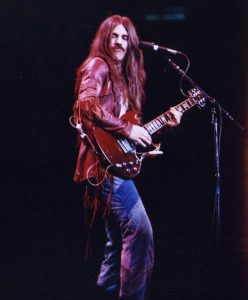 A friend has a question for you: Could you imagine how today’s music would be, if Jimi Hendrix had never existed?
A friend has a question for you: Could you imagine how today’s music would be, if Jimi Hendrix had never existed?
Wow, that’s a good question! Look, obviously Jimi Hendrix was the primary influence on what eventually became rock blues guitar, especially the psychedelic style. But, were there other people who would have done things? I’m sure they would have. But they would have done it in a very different direction. You know who Richie Havens is, right? I met once Richie Havens and I was a bit shy because I knew he played Woodstock and he knew Jimi Hendrix personally. He said something very profound to me one day: “You know, Jimi Hendrix didn’t play the guitar, he played the amplifier”. And it made absolutely sense to me. He was the absolutely perfect guy, he wasn’t the most technically able guy, he didn’t do any you couldn’t do. Look at Allan Holdsworth, it’s impossible to do some things of what he does. But he had a certain sound. Back in 1966-67, when we first listened to that music, nobody said “Wow, what a guitar player!” Nobody thought of guitar players, definitely. They only thought about the music and sound. When The Beatles came out with “Sgt. Pepper’s” nobody said “What a great drumming!” or “What a guitar!” Nobody ever looked at a band as musicians who played instruments. What we heard was the sound of the entire piece of music. When Jimi Hendrix did what he did, we said “What a sound! It sounds like an elephant!” It was the journalists who launched on the idea of a guitarist. I never look at myself as a guitarist. Somebody says “What you do for living?”, I ‘m a musician but I’m not a guitarist. For me a guitarist is Andres Segovia. Jimi Hendrix is a musician to me, isn’t a guitarist and I’m not a guitarist. I’m a musician who got to play the guitar. The journalists started calling somebody “a guitarist, a guitarist” or an “axeman”. And they grew up a whole generations of kids who wanted to be like that. To call someone because of his instrument is like calling a baseball player, a “bat”, or “the guy who uses the bat”. The bat is the tool, you know, not a player. The same with a hockey player. Nobody calls him differently because he uses a stick. I think the guitar is a tool to express your ideas. John Coltrane expressed his ideas on saxophone and Dennis Chambers expresses his ideas on drums. There are all kinds of instruments. So, I think it was a kind of invention of the press.
In the ‘80s you did some concerts with Stevie Ray Vaughan. Did you have the chance to do any jamming together?
No, no, no. I tried to talk to him but he didn’t talk to me. I don’t know why (ed: Then I referred to Johnny Winter). Johnny Winter is the guy that I absolutely love. I love Johnny Winter but I didn’t get the chance to play with Johnny Winter. Somebody told me that they want me to be on an album for him or with him. I don’t know if that’s going to happen. Somebody told me that it will happen. I ‘m waiting to do it. I hope it will happen. Because Johnny Winter for me is like the last of the real guys. He’s an influence to me, just like Hendrix. People forget that I was influenced by John Cipollina from Quicksilver Messenger Service. This is a very-very big influence for me, probably more than Jimi Hendrix. Johnny Winter was great. Stevie Ray Vaughan yeah, great player. I wish he would have said something to me.
Maybe he was thinking that you were better than him.
No, no. I don’t believe that was the reason. I was saying to him “Hey, hello, how are you doing” or whatever because we were waiting to go onstage and took a certain look at me and he didn’t say anything. He didn’t want to talk.
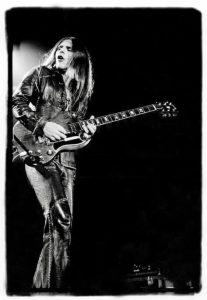 Robby Krieger from The Doors is one of the first who played with Gibson SG. I think he is one of the most underrated guitar players along with you, even he was a member of a popular band-.
Robby Krieger from The Doors is one of the first who played with Gibson SG. I think he is one of the most underrated guitar players along with you, even he was a member of a popular band-.
-I agree with you, entirely and absolutely. Absolutely! I love Robby Krieger, I still do and I always did. When I did a song called “Poppy”, I quoted, I musically quoted the line that he played on “Light My Fire”. Because I was trying to quote that time of my life.
I had the huge honour to talk with my favourite drummer and hero of mine, John Densmore (The Doors drummer).
Yes, one of mine! One of mine, for sure!! You know, I’m also a drummer. These guys you are mentioning they became so great because they played music and they listened. They didn’t do performance, they listened to the band and they played music. They played what was necessary for the music. They weren’t performing, they didn’t say “Look what I do”. They played music and that’s why I love them. They were musicians.
I don’t know what happens to North America, but in Greece, especially in Greek music press, it’s very odd to say that you like The Doors. It’s very popular to hate The Doors.
I like The Doors! You know what Circus and Creem magazines did when I covered “Roadhouse Blues”? You know what they did? They wrote a headline “Frank Marino robs fresh grave”. They wrote that Frank Marino steals from a new grave: Jim Morrison’s, you know. Just because I covered “Roadhouse Blues”. In other words: Now I was stealing from Jim Morrison. It was the headline in a magazine. That’s what it’s wrong with these people. I don’t like them. You know, I’m doing the wrong business.
No. I have thought of it for myself too. You are good at making, you are not good at selling.
Not at all. I have never sold anything in my life. I’m not the guy who sells the guitar or amplifier or car to buy a new one. I don’t know how to sell anything. When somebody comes and says to me “I want your guitar or pedal. Can I buy it?”. I would give it to him. I just feel guilty to say to that guy “Yeah, give me so much money for it”. I just feel stupid doing that. I’m not a good salesman. I have never been a good salesman.
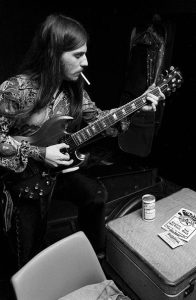 Do you like younger guitar players like Derek Trucks and Joe Bonamassa?
Do you like younger guitar players like Derek Trucks and Joe Bonamassa?
Yes, very much, though! They are very good and respectful players. Somebody sent me a week ago an article (ed: published on 7 December) where Joe Bonamassa says: “My friends would ask me, ‘Have you heard the new Van Halen record?’ And I’d be like, ‘Nope.’ I was listening to Frank Marino and Mahogany Rush.” Somebody told me that he was in one of my shows when I was playing and was watching me. But anyway, I was surprised when I saw the article some days ago. I thought that’s very nice.
“Johnny B. Goode” has been covered by everyone, from The Beatles to The Sex Pistols-.
-Oh, yeah! Oh, yeah!
Your version is by far the best. Are you proud of this cover?
Do you believe that? Let’s put it this way: It wasn’t an intended cover. I didn’t say to the band “Let’s do ‘Johnny B. Goode’ ”. Because we jammed a lot. “Johnny B. Goode” first happened onstage during one of the nights when I was just starting to doing a song. Because everybody knows “Johnny B. Goode” and that’s why we played it. I’ll tell you this: When I was touring with Johnny Winter, I didn’t do it once on that tour (laughs). There was no way to play “Johnny B. Goode” while I was playing with Johnny Winter .
A huge “THANK YOU” to Mr Frank Marino for his time.
Please check out www.mahoganyrush.com and http://www.facebook.com/OfficialFrankMarino

